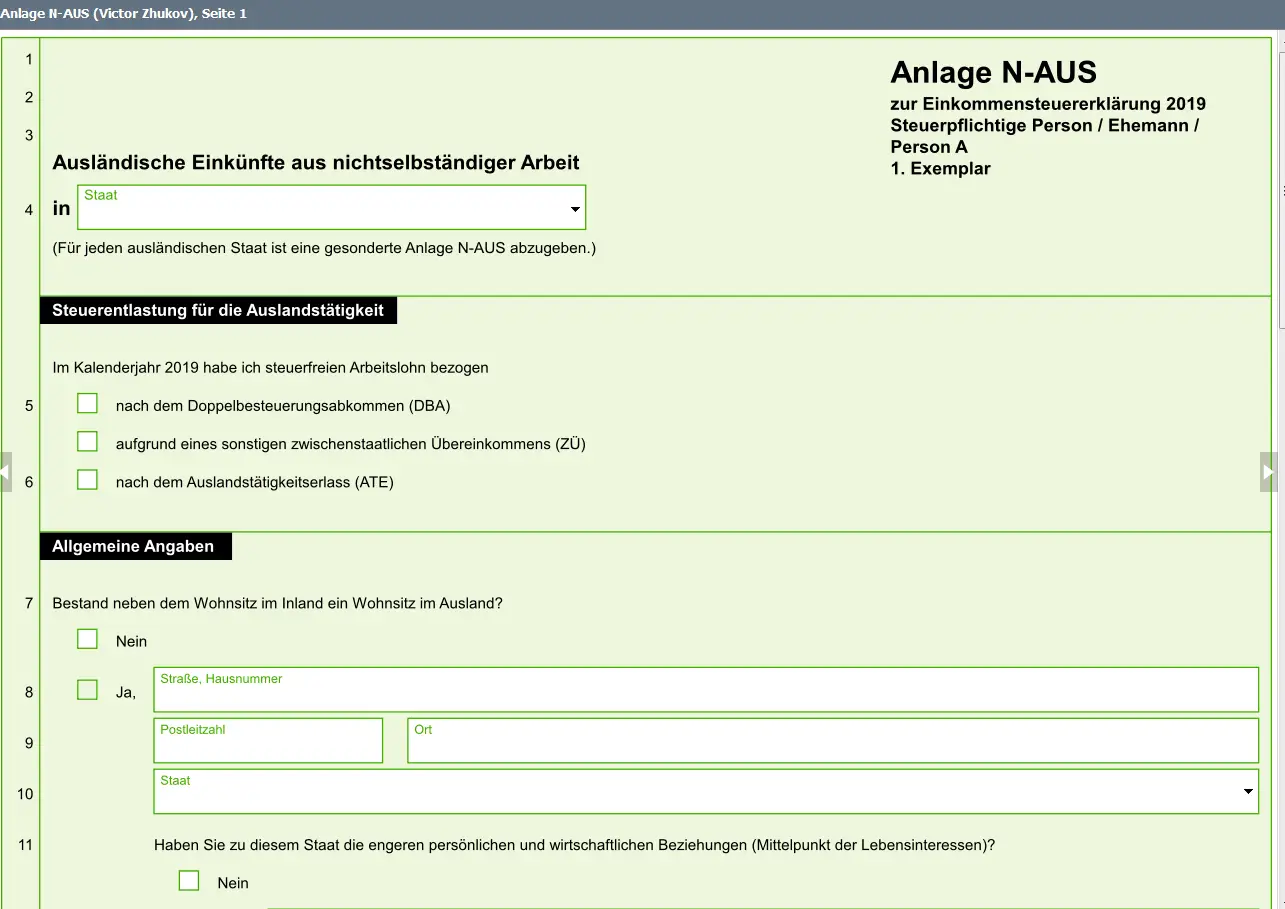Last Updated on October 10, 2023
For a long time I was asked to write about Anlage N-Aus, but I always advised to go to the tax consultants for the first time (in LohnsteuerHilfe Verein), since it is not simply.
This Anlage is really complex. But it is possible, that you don’t need this Anlage at all.
If you are first year in Germany or leave it this year, then you need Anlage WA-Est. it has existed since 2017.
Read about Anlage WA-Est here.
All I can return from tax: A-D, E-H, I-N, P-W
Anlage N Part 1, Part 2, Anlage N-Aus, Anlage Wa-Est, Homeoffice
Anlage Kind
Anlage Vorsorgeaufwand
Anlage Sonderausgaben
Anlage Haushaltnahe Diensleistungen 35a
Who should file a tax return in Germany
Pre-filled declaration in Elster
How to calculate tax in Germany. What is written in Berechnung in Elster
Freiberufler in Germany: how to fill in Anlage S and Fragebogen zur steuerlichen Erfassung
I remind you that I translate and collect information that I can find, but I am not a tax consultant.
Anlage N-Aus – for those who already live in Germany and make some work abroad.
I have still more questions, and I’m not sure in answers. There is no normal review of the application on the network, basically all reviews with the same words, as in Elster’s help. And there was not even an interview mode for this application in it.
To fill out the application with confidence, you need to read the double taxation agreements, know what is taxed and not taxed, and have a good knowledge of Werbungskosten.
Do not forget about the deduction of the move and double households.
Read about Werbungskosten in topic All I can return, part 4
It was more convenient for me to make screenshots in the PC version. The line numbers must match the online version.
General information in Anlage N-Aus
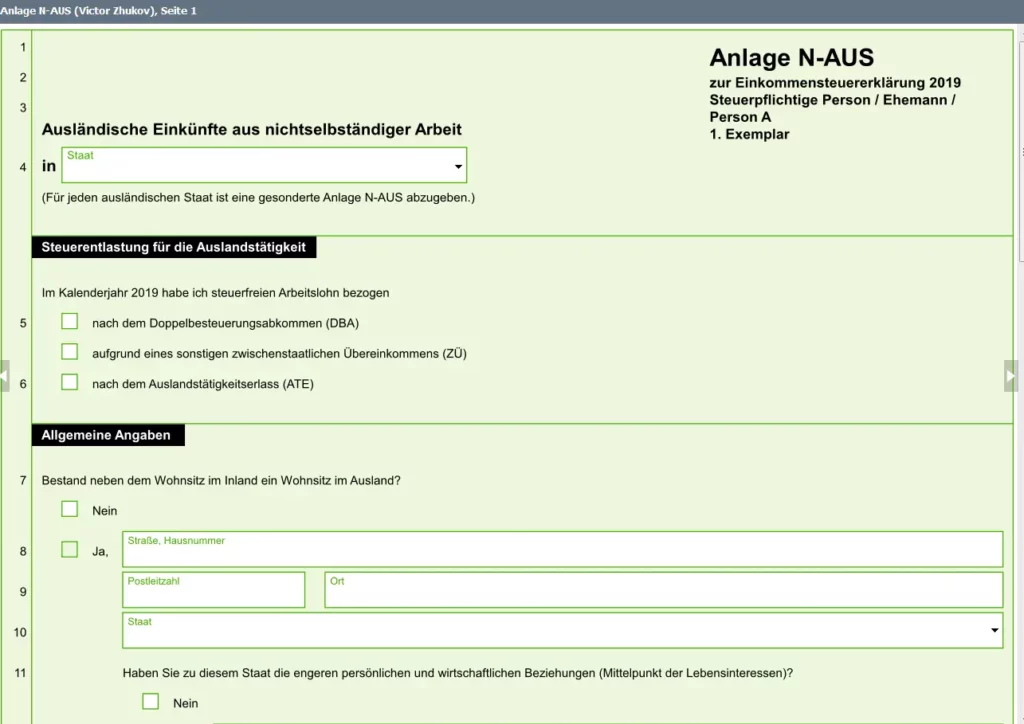
Line 4 – select the country where you worked.
Line 5 – Taxation under DBA double taxation agreements or special agreements (second line). What countries have such agreement – look at : link.
Special agreements ZÜ, if I understand correctly, these are all sorts of international organizations (list here), such as NATO troops, the UN, etc.
Line 6 (ATE) – those who do not fall under the double taxation agreements, i.e. no such agreement has been concluded with the country.
Lines 7-10 – do you have housing at a foreign country, where you worked, or not. Those who travel across the border every day say no, and those who lived abroad write the address.
Line 11 – do you have interests in that country (for example, you have a wife and children there).
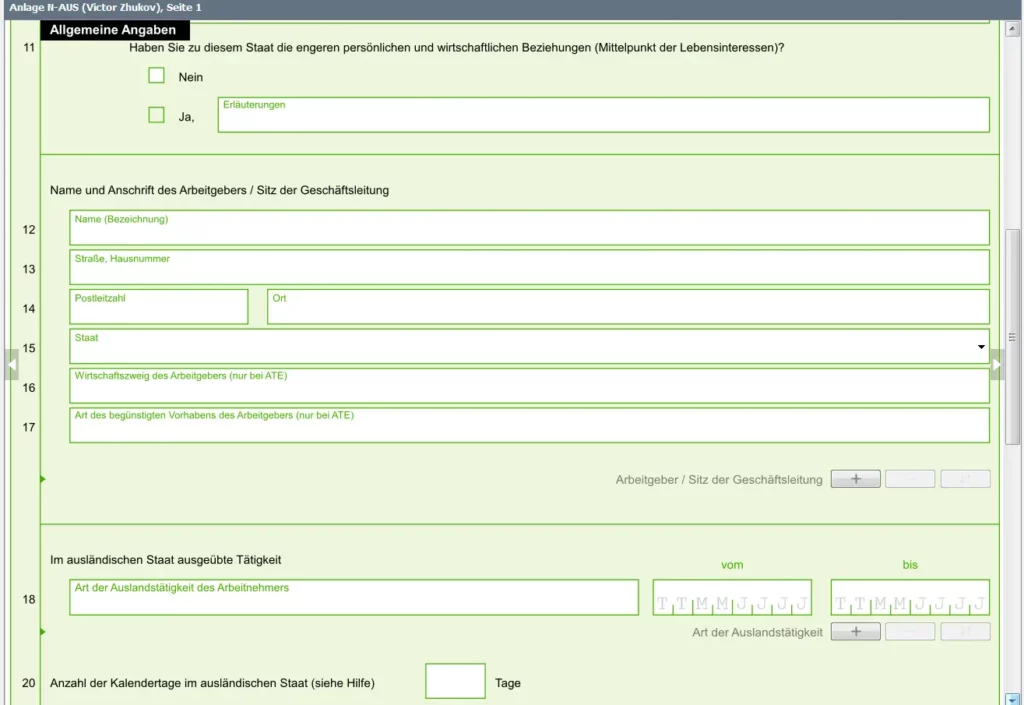
Lines 12-17 are employer information.
Lines 18, 19 – what exactly did you do and in what period (how many days, including weekends)
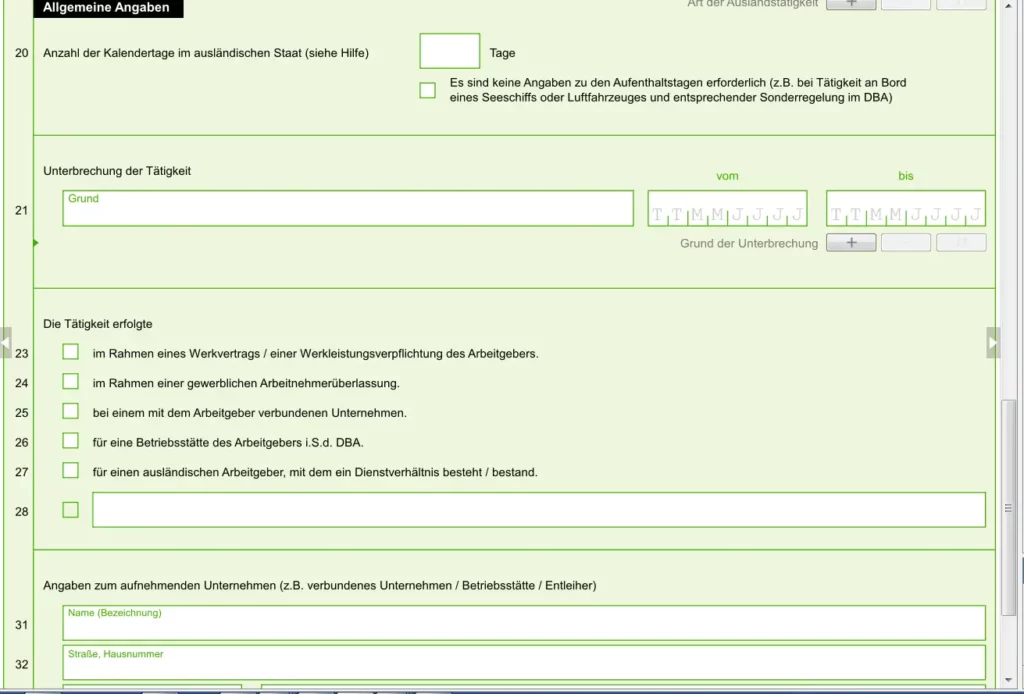
Line 23 – under an employment contract with an employer.
Line 24 – for outsourcing.
Line 25 – in the company associated with the employer.
Line 26 – in the foreign branch of the employer (if the period exceeds 183 days).
Line 27 – if services were provided.
Lines 31-34 appear to be for the host organization if you did not work for your employer but for a related company or branch.
Income
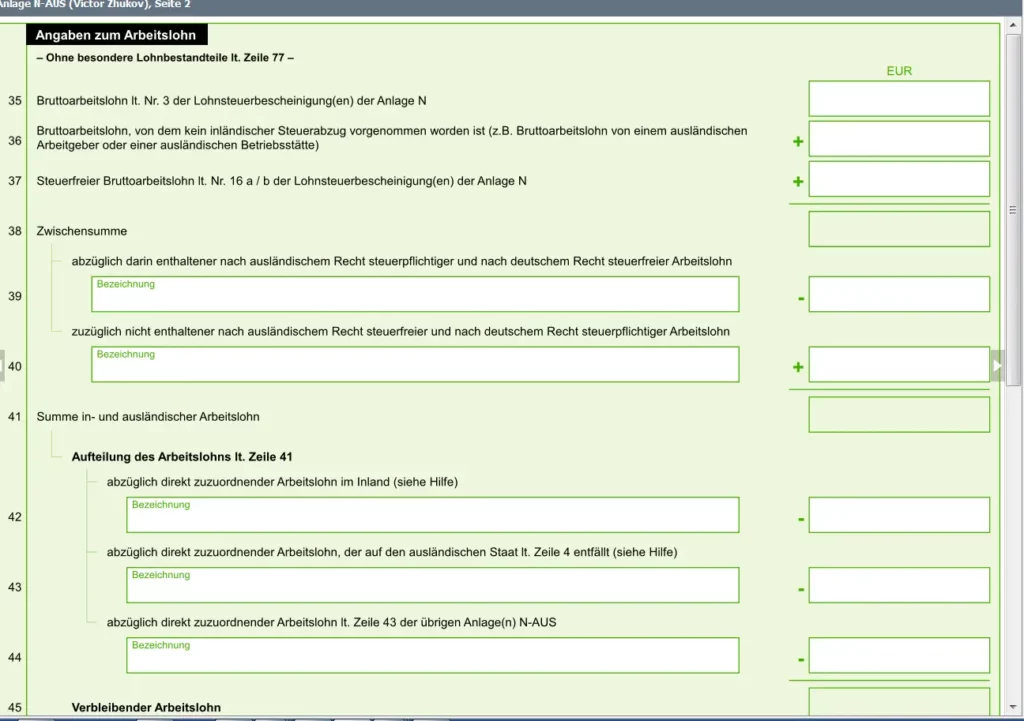
Enter gross income in lines 35-36. In this case, gross should be calculated according to German laws, and foreign currency should be converted into euros at the average monthly rate of the European Central Bank (link according years).
That is, the salary for each month should be transferred, then summed up.
On line 35 the amount for German income, on line 36 foreign income. Line 37 – for tax calculation.
Line 38 is income that is not taxed under German law. For example, a pregnancy benefit. I have find such list of non-taxable income on one site:
- Leistungen aus der Arbeitslosenversicherung, (Unemployment insurance benefits)
- Kinder-, Ausbildungs- und Unterhaltszulage, (Child, education and maintenance allowance)
- Steuerfreies Krankentagegeld, (tax-free sickness allowance)
- SUVA-Geld (bei Grenzgängern in die Schweiz),
- Sonntags-, Feiertags- und Nachtzuschlage,
- Mutterschaftsentschädigung, (Maternity allowance)
- IV-Taggelder (bei Grenzgängern in die Schweiz),
- Direktversicherungsbeitrage, (Direct insurance premiums)
- Ermaßigt zu besteuernde Bezuge.
Line 39 – income taxable abroad but not taxable in Germany
Line 40 – income not taxed abroad, but taxable in Germany.
Further, for me the most incomprehensible lines. On one forum a typical situation was discussed: part of the year in one country – income is taxed, part of the year in Germany – income is taxed. I resume what people think about it.
Line 42 is the taxable salary in Germany. This also includes all income directly related to work activities: additional payments for additional work, work on weekends, etc.
Line 43 is the salary abroad, it was taxed there and it relates directly to work activities.
Line 44 – other overseas salaries, they were taxed already – if there are any on other Anlage N-Aus.
The balance may remain amounts that are not directly related to work. They must be distributed mechanically according to the number of days worked there and there. Which is what is done in the following lines.
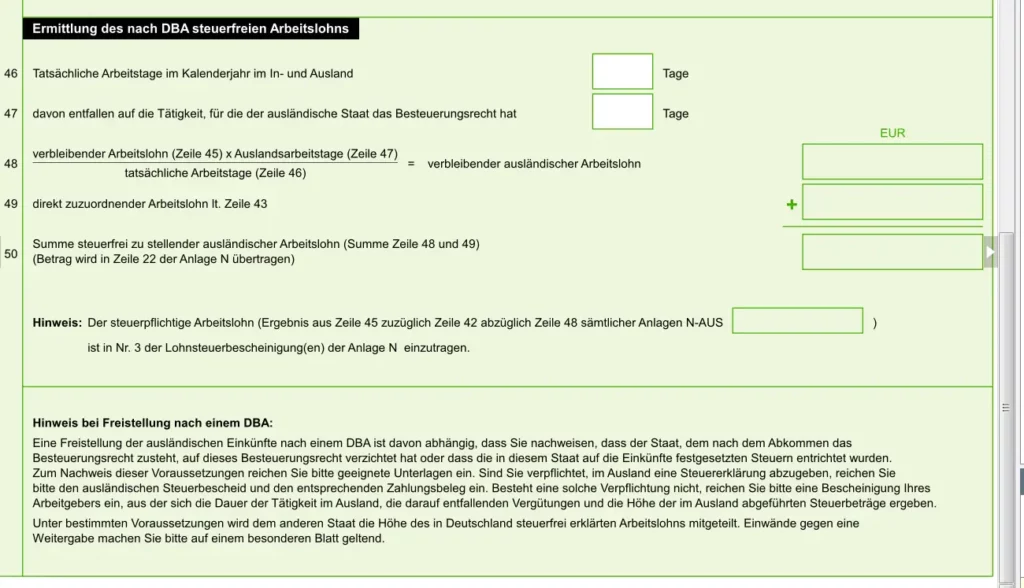
If I understand correctly, work in some countries is fully calculated for these lines (then it turns out that they don’t need lines 42-44?):
Albanien
Algerien
Aserbaidschan
Bulgarien
Costa Rica
Danemark
Finnland
Frankreich
Italien
Kasachstan
Korea
Kroatien
Norwegen
Polen
Rumanien
Schweden
Slowenien
Tadschikistan
Turkmenistan
Ungarn
Uruguay
Zypern
Line 46 – the number of real office days: the amount abroad and in Germany, to that line 47 – abroad.
Follow me
If the balance on line 44 is zero, then all remains as it is:
- German income will be taxed according to German laws,
- foreign income will not be, since it is already taxed,
- but their amount will go to Anlage N and increase the grade (Stufe) for taxation.
And in order not to get a significant progression, you need to indicate your operating costs (Werbungskosten) in lines 72-73.
Lines 61-70 for ZÜ and ATE
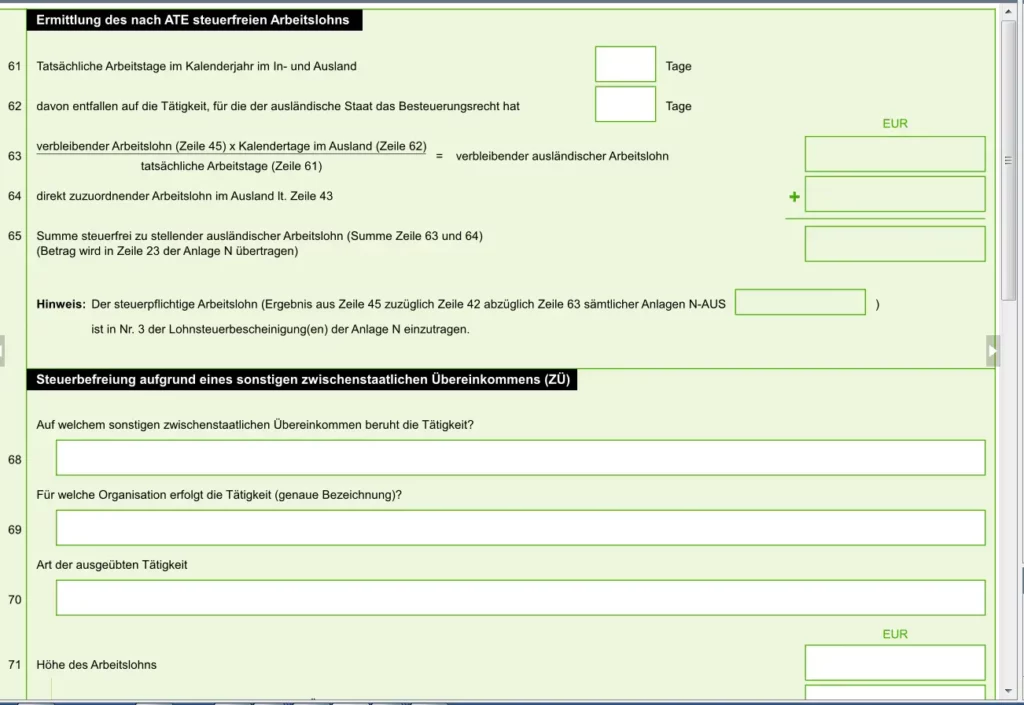
Lines 72, 73 for Werbungskosten
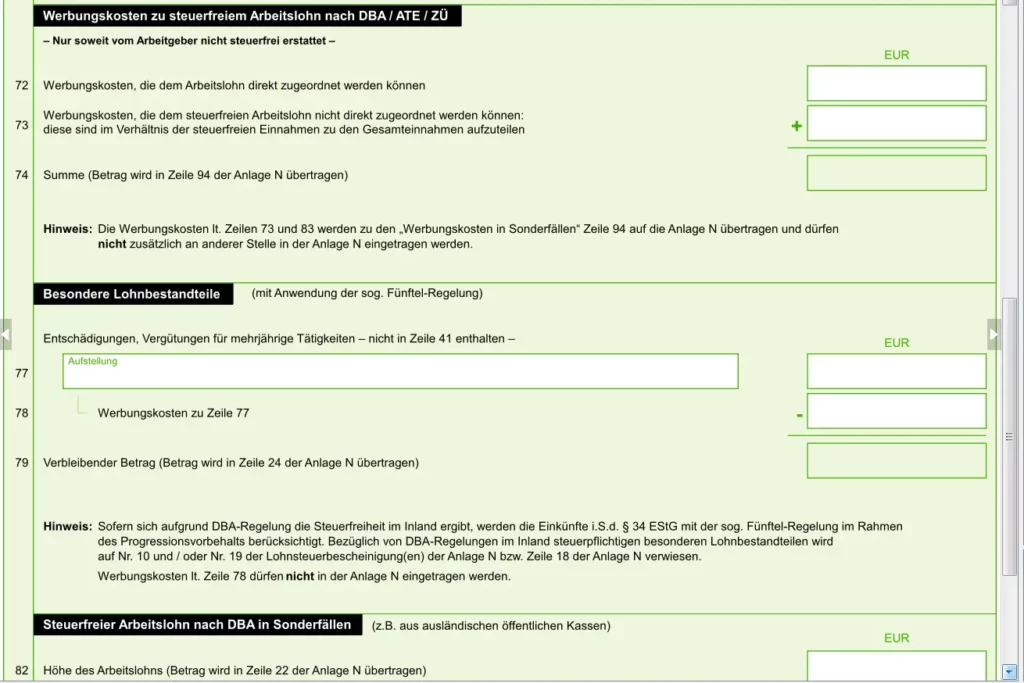
Line 72 – expenses directly related to work, for example, travel to work.
Line 73 – other expenses (for example, office or labor) in terms of income not taxed in Germany. That is, if you bought working tools that will be useful to you in Germany, then you should only take into account the value attributable to the part of income abroad (for example, 30 percent).
Insurance does not apply to work expenses, only legal assistance on work conflicts. The forums offer to record insurance abroad in Sonderausgaben.
For the Werbungskosten, it is recommended that you include an explanation of which costs you wish to deduct.
About Anlage Sonderausgaben.
About Werbungkosten – All I can return. Part 4
Other posts about German tax return – #steuererklaerung
Do you enjoy the site without cookies and maybe without ads? This means that I work for you at my own expense.
Perhaps you would like to support my work here.
Or Cookie settings change: round sign bottom left

